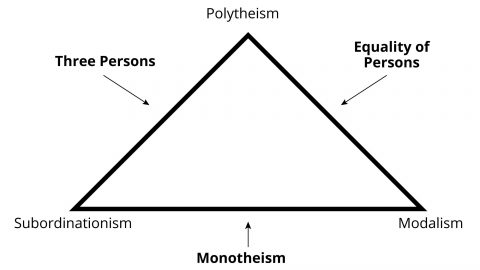Let’s talk a bit about 2 John 9, as it has been thrown about a lot lately.
First, you always look at a text in its context, and in this case, that is determinative. Look at what John is talking about (translations mine):
“For many deceivers have gone out into the world, the ones not confessing Jesus Christ having come in the flesh. This one is the deceiver and the anti-Christ. Watch yourselves, so that you do not lose what we have accomplished but instead receive a full reward.”
Clearly John is continuing the theme that appears throughout his first epistle with reference to the “deceivers” (πλάνοι) who have gone out into the world (compare 1 John 2:23, 4:2-3, 15). They are described as those “not confessing Jesus Christ having come in the flesh,” that is, there seems to have been some form of what we might call proto-gnosticism in the church in John’s day, a form of docetism that denied the reality of Jesus’ physical body. It is important to note the phrase ἐξῆλθον εἰς τὸν κόσμον, “went out into the world.” They went out of the church, specifically (compare 1 John 2:19 for “went out”). These are the deceivers, the anti-Christs, the false teachers. They have left the church for the world. John warns believers to “look to themselves,” be watchful, for apostates can be some of the most beguiling of false teachers. They know our language, our modes of speech, and hence can disarm us and sneak up on us. We are to be watchful.
Importantly, this is the context that immediately precedes our text, that of apostates who were once a part of the church but do not teach that Jesus Christ has come in the flesh, i.e., the early docetics. So now to the main passage:
Every one going too far and not abiding in the doctrine of Christ does not have God. The one abiding in the doctrine, this one has both the Father and the Son. If anyone comes to you and does not bear this doctrine, do not receive him into your home and do not pronounce greetings, for the one pronouncing a greeting participates in his evil works.
The first substantive participle, “the one going too far,” seems to indicate the idea of going outside the bounds, in this case, outside the teaching, the truth that has been given to the church concerning Jesus and His incarnation. He does not abide, remain in, the teaching, the doctrine. Given that this is a definitional doctrine, de fide one might say, the one who violates this truth has neither the Father nor the Son. These are strong words which, we must confess, few today ponder deeply.
The first “you” in verse 10 is plural, comes to anyone in the church. Now let’s remember, there were no church buildings at this point in church history. The church met in homes or, I suppose in rural settings (as noted by history), out in the countryside. But in these days showing hospitality was vital. You took people into your homes, provided food for them and shelter. There wasn’t a Motel6 on every corner. Especially in the Christian context, traveling preachers and teachers would come into an area and seek a place from which to do their teaching in someone’s home. So here we have a test provided by the Apostle: if someone comes and does not “bear” or carry with them this doctrine, that is, the doctrine that Jesus has come in the flesh, then they are not to be received “into your home.” Clearly, the Apostle is addressing people who claim to be Christians here, as the context of verse 7 shows. One would not expect a pagan to come “bearing” the proper doctrine of Christ’s incarnation. This is specifically about false teachers in the church (compare Gal. 2:4-5). This is further indicated by the giving of the greeting. In our culture saying “hi” means very little, but in the ancient culture, and amongst Christians, greetings were far more important. The “holy kiss” and the “maranatha” were part of the greeting and parting. To give the intimate sign of Christian fellowship to such a person would signal your acceptance of their teaching, and hence would signal to others the orthodoxy of the person to whom you are giving the greeting, making you complicit in their activities.
So with these things in mind we see that this passage teaches us to examine the doctrine of Christian teachers and to not give a basis for operation in our communities for those who are not orthodox in their teaching. Likewise, we can see the text has nothing at all to do with doing debates, outreaches, or even dialogues with those of other religious faiths. Even if we greet them, we are not doing so in the context of 2 John, for the greeting there had a particular content and meaning generally absent from our greetings today (surely I do my best to avoid a holy kiss, or in my case, even the holy side hug!). Surely we are not taking them into our homes in the sense of giving them a platform from which they can teach Christian heresies, or anything of the like. Attempting to apply this text to non-compromising outreaches, interactions, debates, etc., is clearly a misuse of the passage in its original context.




